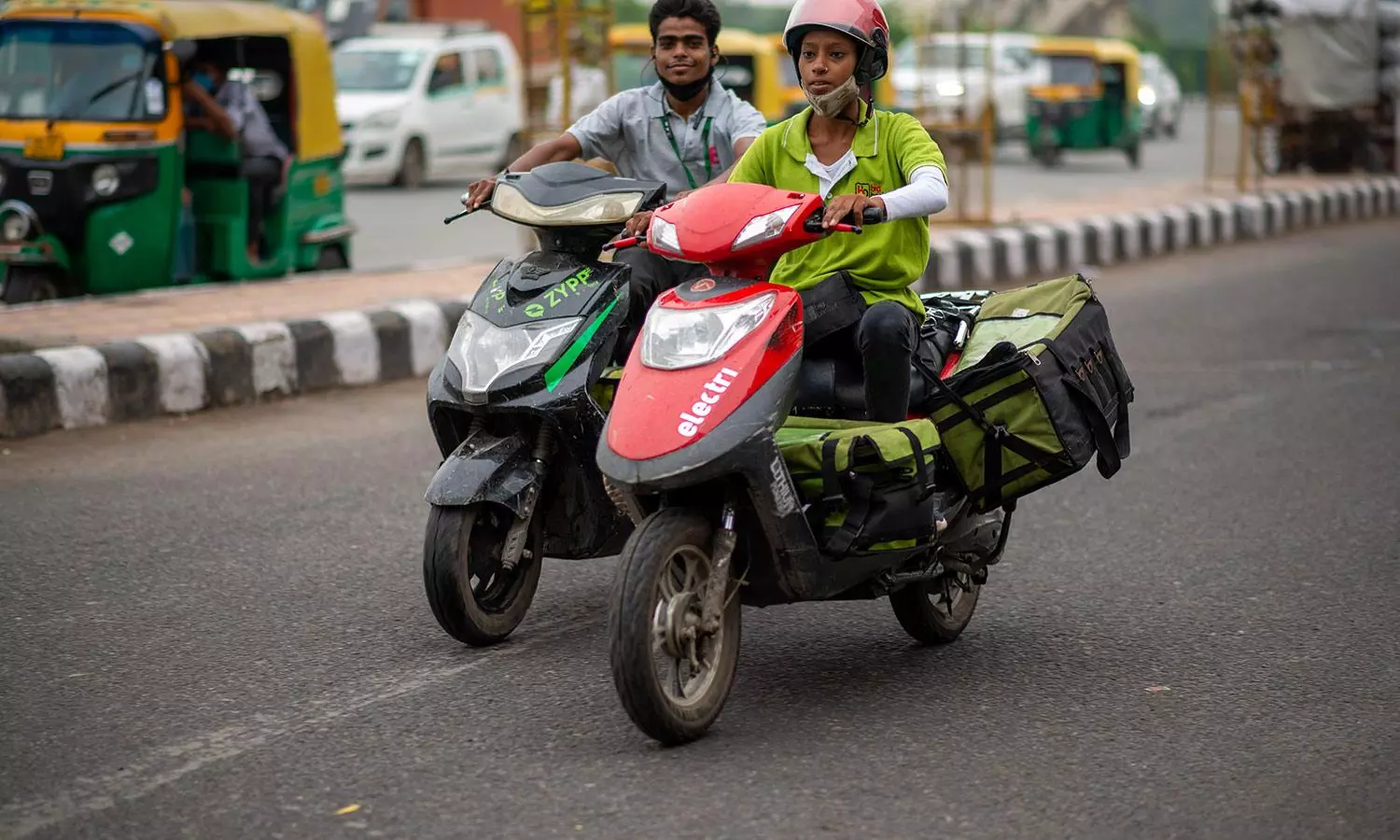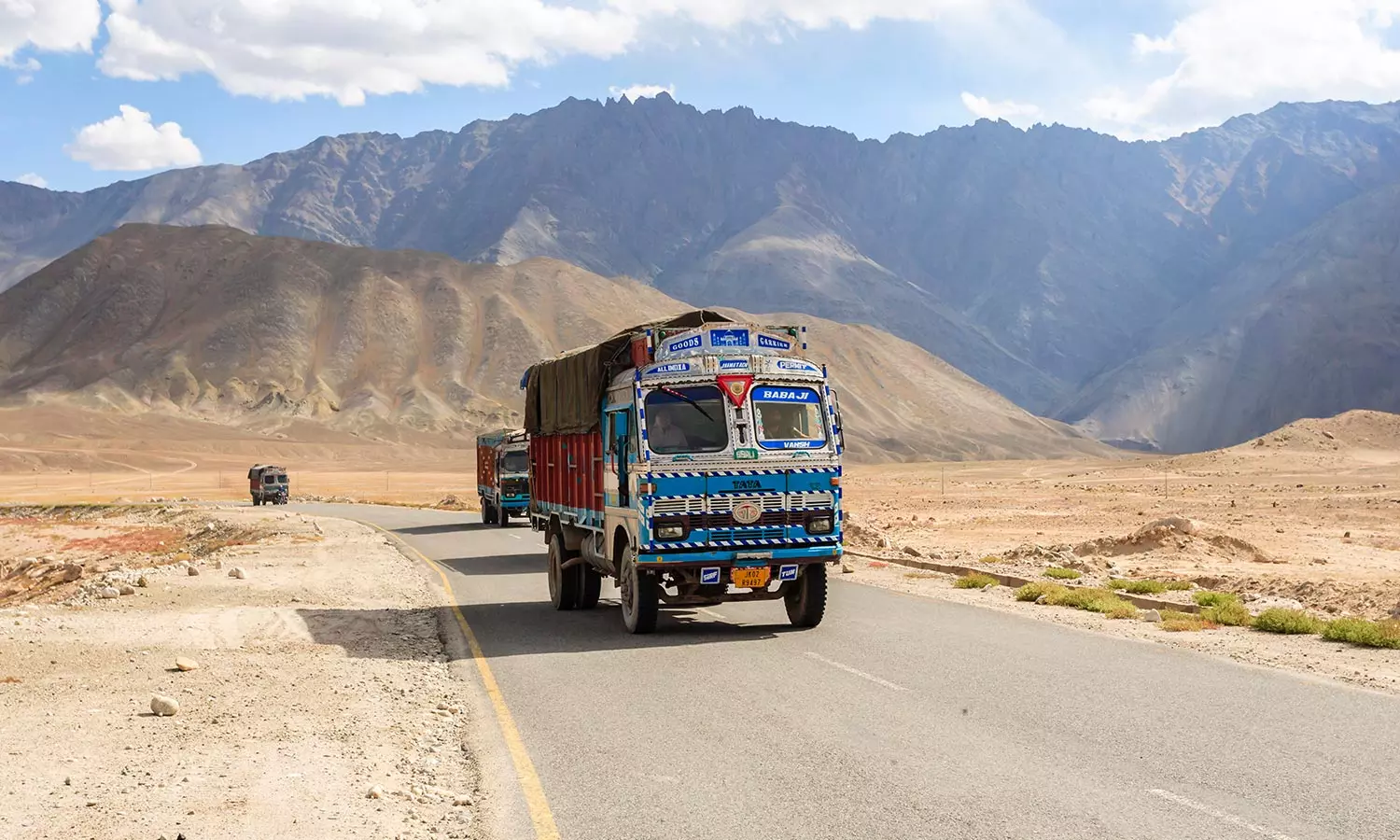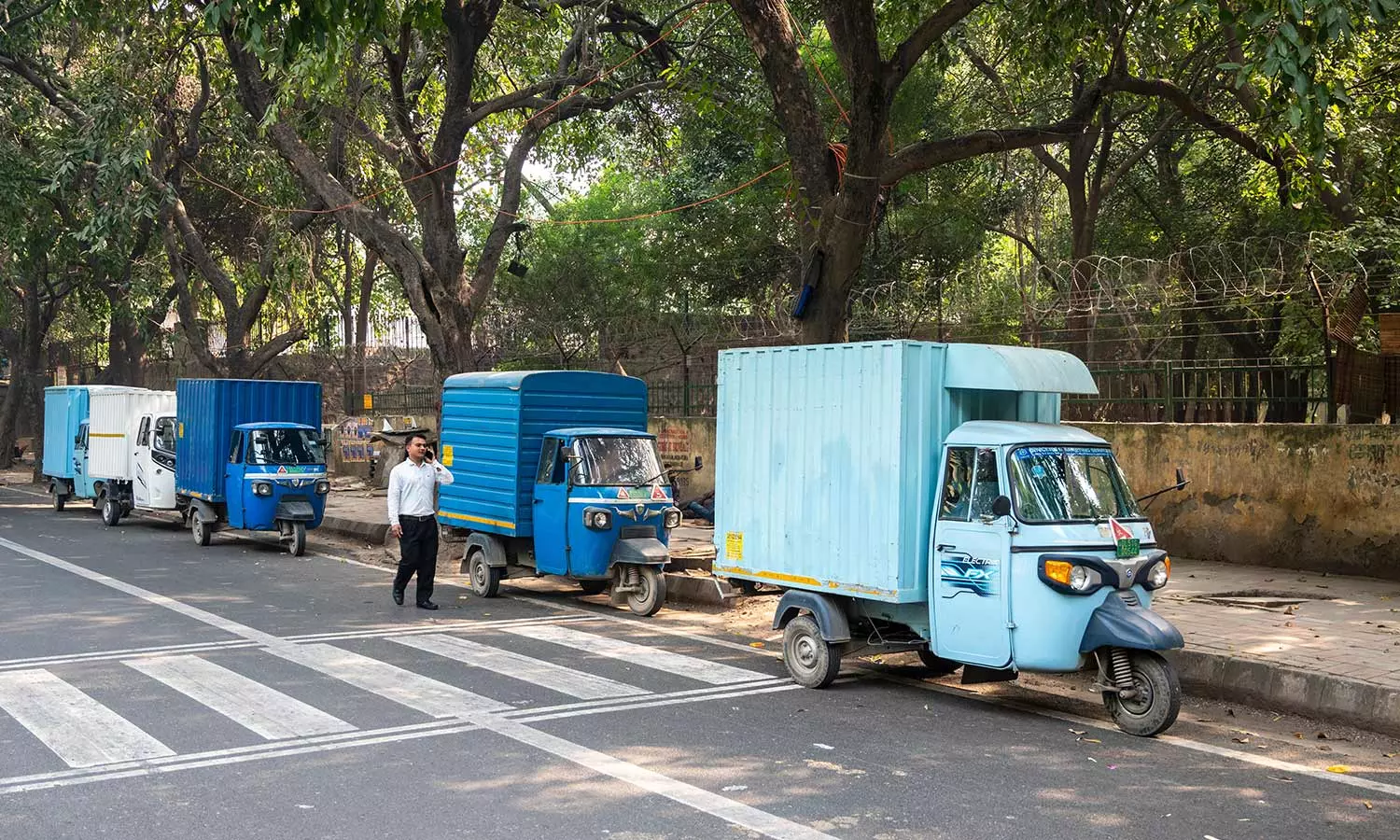Startups disrupting India's logistics sector: A revolution in motion
Indian startups revolutionise logistics with EV adoption & tech innovations, paving the way for sustainable last-mile delivery.

"Indian startups are disrupting the logistics industry by revolutionising traditional practices through digitisation, automation, and innovative technologies," said Sandeep Bansal, Chief Business Officer, Falcon Autotech, during a recent interview with Indian Transport & Logistics News (ITLN). The growing economy, rapid urbanisation, and increasing digital adoption are other factors influencing this transformation.

"Indian startups are disrupting the logistics industry by revolutionising traditional practices through digitisation, automation, and innovative technologies." Sandeep Bansal, Falcon Autotech.
Similarly, Nishith Rastogi, Founder and CEO of Locus, also informed us that Indian startups are using new-age technologies to enhance operational efficiency, reduce costs, and improve the overall customer experience.
Startups powering India's logistical wheels
"Historically, warehouse automation in India often required importing technology from foreign countries. However, with the emergence of new-age companies like Falcon, the landscape has changed. Indian startups are spearheading a transformation by developing innovative and efficient automation solutions tailored for India, by India," added Bansal.
The last-mile delivery landscape 2024 has transformed, focusing on timely deliveries and cost reduction, as highlighted in FarEye's report "The Year of Change: Eye On The Last-Mile 2.0". This transformation has been driven by technology, particularly AI-powered startups in India. For example, Locus has facilitated over a billion deliveries across 30+ countries and, in the process, saved over $288 million in logistics costs with the help of AI, as stated by Rastogi.
"At Locus, we enable logistics excellence across all miles through our AI-driven, order-to-delivery logistics platform. By leveraging advanced optimisation algorithms and intuitive workflow automation, we empower enterprises to transform their logistics operations from cost centres into revenue generators," added Rastogi.
On the other hand, ProcMart is digitising procurement processes and optimising supply chains. "At ProcMart, we're revolutionising India's supply chain industry by providing a comprehensive B2B procurement marketplace that integrates advanced AI technologies. Our platform connects various stakeholders, offering them access to a wide range of products, efficient sourcing solutions, and strategic collaborations with local vendors," said Sachin Jain, Chief Financial Officer (CFO) and Chief Strategy Officer (CSO) of ProcMart.

By digitising procurement processes and optimising supply chains, we're driving significant advancements in how businesses manage their supply chain operations.”Sachin Jain, ProcMart.
According to the FarEye report, leaders should use AI, EVs, and drones to optimise operations and achieve sustainable, low-carbon deliveries. Leveraging AI and predictive analytics for demand forecasting and route planning can significantly reduce operational expenses. According to Bansal, businesses are evolving with these homegrown technologies, leading to increased efficiency and improved supply chain management.
The current landscape
India's logistics sector has historically struggled with inefficiencies, fragmented operations, and infrastructural challenges. However, the emergence of startups focusing on last-mile delivery, supply chain optimisation, warehousing solutions, and digital freight platforms is ushering in a new era of efficiency and reliability.
The FarEye report further highlighted that demand for faster and more convenient delivery options is rising, with customers expecting same-day and next-day delivery as the norm. The ease of returns and seamless post-purchase experiences will be critical differentiators for last-mile providers, ensuring a positive and hassle-free customer experience throughout the delivery lifecycle. Profit optimising costs will remain crucial for last-mile providers to maintain profitability.
The shift in shopping habits post-pandemic has led to significant changes in the logistics industry. E-commerce companies are now offering fast deliveries, resulting in substantial growth in the sector. Many startups, especially in the EV sector, are meeting the increasing demand. EV as a Service has become popular, offering tailored programmes to accelerate EV adoption. According to Akash Gupta, Co-founder and CEO of Zypp Electric, this benefits all stakeholders.
Electric Vehicle as a Service (EVaaS) is a subscription-based model that provides users with access to electric vehicles (EVs) without the burden of ownership. This model offers benefits such as flexibility, cost savings, access to the latest technology, reduced maintenance hassles, and contributes to sustainable mobility. Zypp Electric is an Indian startup that focuses on providing eco-friendly last-mile delivery solutions through EVaaS.
While this is generally true, a quality delivery experience can be a revenue driver. Most shippers struggle to maintain a balance between cost and quality, and thus, outsourcing is not the only solution if they want to gain a competitive advantage. For carriers, last-mile delivery is the heart of their operation. Many are focused on reducing last-mile delivery costs and enhancing customer experiences.
As technology and connectivity improve, shippers are beginning to outsource delivery networks with more choices than ever before. Competition is heating up, making it more critical to be technology-driven to improve efficiencies.
By giving up control of the fleet and outsourcing parts of or sometimes the whole of their network, last-mile leaders are achieving cost efficiencies and aiming for more speed, flexibility, and scalability.
In 2019, Trucknetic began changing the process of booking trucks to transport goods across the country. "The idea is very simple. It is to make trucking as simple as booking a cab in real-time through platforms like Ola and Uber," said Arham Partap Jain, Founder of Trucknetic.
Discussing the level of technology adoption, the founder of Trucknetic mentioned, "In India, tech adoption in tier two cities and beyond is relatively low. Despite the widespread availability of 4G, the impending arrival of 5G, and the high number of smartphones in the country, the adoption and adaptability of technology is not as great, except perhaps in the case of social media."
During the conversation, Trucknetic's founder highlighted the challenge of tech adoption in the logistics industry. Tech adoption is low among drivers, as they are mainly from tier II cities or villages where tech adoption is already low. However, technology adoption can completely transform the logistics industry, mainly through AI, to predict cost-saving routes and potentially save trillions of dollars globally.

“EV as a Service has become popular, offering tailored programs to accelerate EV adoption.”Akash Gupta, Zypp Electric
Technology as a game changer
The logistics sector is experiencing disruption driven by technology, mainly through startups' innovative use of AI, IoT, and machine learning. These technologies enhance visibility across the supply chain, optimise logistics operations, and reduce costs. Gupta emphasised the importance of technological advancements in leveraging big data to assess strategy and improve services. Fleet operators are empowered to deploy their fleet effectively, maximising order count and earnings for delivery partners.
Zypp, as a full-stack platform, integrates technology and fleet management, providing dedicated dashboards for operations and business partners, as well as a dedicated app for delivery partners to track fleet and earnings. This approach results in increased clarity, transparency, and confidence, fostering deeper growth and expansion across India.
Jain and Bansal agreed on logistics advancements. Bansal emphasised the ability of logistics companies to scale operations and optimise inventory management using AI, driving efficiency and innovation. Rastogi added that continuous innovation and AI insights empower businesses to be more agile in the logistics landscape. Jain highlighted ProcMart's AI and ML algorithms for data-driven inventory management decisions.
As stated by Falcon's Chief Business Officer, there is a growing trend towards flexible automation solutions like ASRS, AMRs, and AGVs in India's logistics sector. Falcon, an intralogistics automation solutions provider, has developed innovative technologies such as advanced sortation systems, robotic 3D ASRS, and conveyor automation solutions to streamline warehouse operations and improve efficiency. These technologies aid Indian companies in consolidating warehousing operations, increasing throughput, and reducing logistics costs, ultimately modernising India's logistics infrastructure and enhancing its global competitiveness.
Sustainability as the key priority
In 2024, planet sustainability will be crucial in the last-mile landscape. Industry leaders will prioritise eco-friendly practices such as EV fleets and carbon-neutral facilities. Additionally, there will be a focus on reverse logistics and circular economy models to reduce waste and promote responsible resource utilisation.

“We continuously improve route planning to reduce fuel consumption and carbon emissions. As a result, our clients have saved 12 million kg in greenhouse gas emissions.”Nishith Rastogi, Founder and CEO of Locus.
"Sustainability is a top priority in the logistics industry, and Locus is committed to enhancing sustainability through our innovative solutions. We continuously improve route planning to reduce fuel consumption and carbon emissions. Our clients have saved 12 million kilos in greenhouse gas emissions, equivalent to the emissions sequestered by 30 thousand acres of forest cover each year," said Rastogi.
"Additionally, our industry-first Last-Mile Maturity Assessment tool empowers businesses to optimise their logistics operations for increased efficiency, customer satisfaction, and sustainability," he added.
Jain highlighted the industry's latest sustainability efforts, including reducing environmental impact, promoting ethical sourcing, and enhancing circular economy principles. ProcMart has launched initiatives such as BioFuel and Sustainable Packaging verticals and advocates for eco-friendly logistics practices.
Trucknetic's Jain also mentioned the need to address the high cost of logistics, the unorganised nature of the business, and challenges with asset utilisation and return trips. He added, "To be more sustainable in the industry, it's essential to consider the high cost of logistics in the country, which is 14 to 16% of the GDP. The business's unorganised and pragmatic nature means that 95% of fleet owners own around one to three trucks out of 12 million in the country.
There's also an issue with asset utilisation, as it's less than 50%, meaning that more than 50% of trucks are either stranded with loads or moving with low output. This leads to problems with returns, with 70% of trips not getting any load on the return, and 30% ending up with some return but taking massive haircuts, which can go up to 80% of the front row."

Trucknetic's founder emphasised the importance of reducing the wastage of miles without charging fares as a key performance indicator. We are using machine learning and artificial intelligence to match return trucks with demand opportunities, aiming to reduce the return load deficit and address the demand-supply mismatch, which currently results in significant losses. According to Trucknetic’s Jain, “We are losing close to $75- 100 billion every year because of the demand supply mismatch in the country.

“We’re aiming to reduce the return load deficit and address the demand-supply mismatch, which currently results in significant losses of $75-100 billion annually in the country.”Arham Partap Jain, Founder of Trucknetic
India's last-mile delivery and EV adoption
According to a BCG report titled "Electric Vehicles: Future of Last-Mile Deliveries in India" by Vikram Janakiraman, Natarajan Sankar, Aditya Khandelia, and Aditi Tiwari, last-mile delivery in India is undergoing a significant transformation due to the rapid adoption of EVs in the organised sector. Important players like Zomato and Big Basket have announced ambitious commitments to electrify their fleets, indicating a growing trend towards sustainable transportation solutions.
Zypp Electric's Gupta highlighted the growing adoption of EVs in India's logistics sector, attributing the trend to government incentives and industry initiatives to reduce emissions. While EV usage was initially focused in major cities, there's a noticeable uptick in Tier II and Tier III cities, thanks to increased awareness and supportive policies like the FAME scheme. The availability of affordable electric commercial vehicles facilitates this transition, especially in areas dealing with pollution and traffic congestion.
The adoption of EVs for last-mile delivery in India's Tier II and Tier III cities has notably increased due to shorter distances, less crowded roads, and improved infrastructure. This trend is driven by growing environmental consciousness and the economic benefits recognised by logistics firms.
The last-mile delivery sector is experiencing substantial growth across various sectors, such as food delivery, groceries, and e-commerce, with a projected CAGR of 15-20%. EV adoption is also driven by the significant financial benefits they offer regarding reduced Total Cost of Ownership (TCO), making them financially viable in the long run despite higher upfront costs. This is particularly true for two-wheeler EVs, where TCO superiority becomes evident compared to ICE (An internal combustion engine) vehicles.
The decreasing prices of batteries are projected to enhance the total cost of ownership advantage for EVs, particularly for three-wheelers and four-wheelers, even without subsidies by 2025. Government support at both central and state levels is expected to further drive EV adoption through regulations and initiatives such as FAME-II, which offer incentives for fleet operators to transition to EVs.

The organised sector is in a good position to promote EV adoption by addressing challenges like high costs, financing, and insurance. Large EV fleet operators, often startups, lead the way by acquiring EVs, offering fleets on lease, and providing maintenance and charging infrastructure.
The way ahead
The future of India's logistics sector looks promising, driven by innovation, digitalisation, and customer-centric approach. Startups are disrupting the industry by leveraging technology and innovative business models to improve efficiency and reliability. Their focus on addressing last-mile challenges and digitising freight in India is shaping a more customer-centric ecosystem.
- Indian startupsstartupsstartups in IndiaIndian logisticsIndian logistics startupsIndian logistical startupsstartups in delhibombaybangaloresupply chain startupsEV startups IndiaZypp ElectricLogistics tech IndiaProcMarttruckstruck startup in IndiaUber Ola of IndiaFalcon AutotechLocusElectric vehicle as a serviceIndia's last mile deliveryIndia delivery chainStartups disrupting India's logistics

Rajarshi Chatterjee
Rajarshi is an editorial professional with nearly a decade of experience in writing content for print and online publications. He has hosted numerous entrepreneurship events and moderated sessions at various events, including Flower Logistics Africa. He has previously worked with reputable organizations such as YourStory, YouGov, Inc42, and Sportskeeda and has catered to a diverse range of clients, including Google, PhonePe, the Karnataka State Government, and the Rajasthan State Government. In addition to writing, he enjoys watching films, cooking, and exploring offbeat locations in India.


